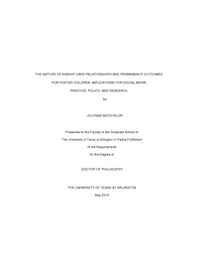
ATTENTION: The works hosted here are being migrated to a new repository that will consolidate resources, improve discoverability, and better show UTA's research impact on the global community. We will update authors as the migration progresses. Please see MavMatrix for more information.
Show simple item record
| dc.contributor.advisor | Scannapieco, Maria | |
| dc.creator | Batchelor, Jolynne | |
| dc.date.accessioned | 2016-07-08T20:07:28Z | |
| dc.date.available | 2016-07-08T20:07:28Z | |
| dc.date.created | 2016-05 | |
| dc.date.issued | 2016-05-04 | |
| dc.date.submitted | May 2016 | |
| dc.identifier.uri | http://hdl.handle.net/10106/25770 | |
| dc.description.abstract | In recent history, kinship care has become the preferred alternative for placement of children in foster care as evidenced by its codification in federal and state policies. Though kinship caregivers tend to fare more poorly on socioeconomic factors than traditional foster and adoptive parents, children who experience kinship care tend to experience better safety and permanency than children in nonkin placements. The term “kinship” is most often broadly defined in child welfare and includes a child’s blood relatives and others who share no biological ties but have a close psychological relationship with the child. Yet, little is known to date as to whether degree of relatedness of a caregiver makes a difference in outcomes for children in foster care. The purpose of this study, which took place in Texas, was twofold: first, to compare the permanency outcomes of foster children placed with kin caregivers as opposed to foster children placed with nonkin caregivers, and, second, to test if degree of relatedness between children and their caregivers makes a difference in permanency outcomes. Based on an analysis of data from the Texas Department of Family and Protective Services, results indicated that children in kinship foster care fare better than those in nonkin foster care on permanency measures, while the effect of degree of relatedness on permanency was encouraging but less conclusive. Findings are discussed in relationship to behavioral biology and followed by a discussion of Texas’ kinship foster care policies using McPhail’s (2003) feminist policy analysis framework. | |
| dc.format.mimetype | application/pdf | |
| dc.language.iso | en_US | |
| dc.subject | Permanency | |
| dc.subject | Kinship care | |
| dc.subject | Behavioral Biology Theory | |
| dc.title | The Nature of Kinship Care Relationships and Permanency Outcomes for Foster Children: Implications for Social Work Practice, Policy, and Research | |
| dc.type | Thesis | |
| dc.degree.department | Social Work | |
| dc.degree.name | Doctor of Philosophy in Social Work | |
| dc.date.updated | 2016-07-08T20:08:31Z | |
| thesis.degree.department | Social Work | |
| thesis.degree.grantor | The University of Texas at Arlington | |
| thesis.degree.level | Doctoral | |
| thesis.degree.name | Doctor of Philosophy in Social Work | |
| dc.type.material | text | |
Files in this item
- Name:
- BATCHELOR-DISSERTATION-2016.pdf
- Size:
- 627.1Kb
- Format:
- PDF
This item appears in the following Collection(s)
Show simple item record


